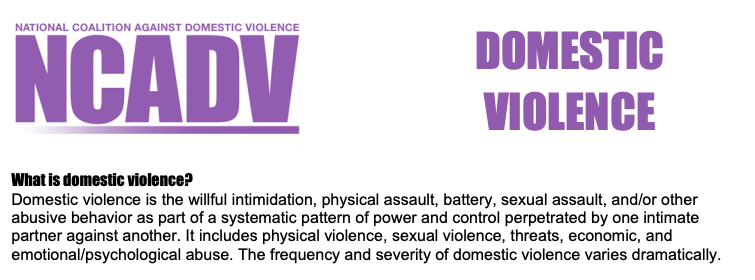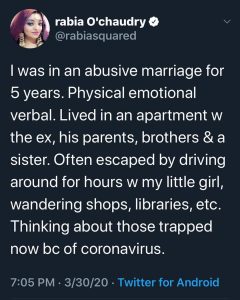

Content and trigger warning: domestic violence.
I am a survivor of domestic violence. It is not something I hide. I have been outspoken about my experience with violence at the hands of an ex. I have shared my story at “Take Back the Night” community events, at community meetings, and yes, at city council meetings. Despite no longer being with the person for nearly ten years, my memories of the violence I endured for 10 years continue to haunt me in my dreams and at times when I am awake. The worst moments are when I am awake and something triggers a panic attack. It happens randomly and I cannot put a finger as to why I respond to certain stimuli until after it happens. I recall one time, when my now partner and husband had asked me to cut his hair. I immediately shut down and started to cry. I could not explain why. I remember the feel of my heart, the beating increasing as though my heart was about to explode, my hands were suddenly extremely cold and sweaty, and I was frozen, with tears running my down face. He immediately asked, “What happened?” and I got up and ran out of the room, sobbing. I ran into the bedroom and almost barricaded the door. After a short time, he came in and he did not say a word. He sat near me and waited. I could not speak, as I could not name what happened or why I was feeling the way I did. Several hours later, after waking from a nap, I finally could explain.
Let me preface this by saying, you are not him. But what you asked of me [to cut your hair] brought back memories when HE asked me to cut his hair. I used a hair shaver. He asked for a semi-buzz cut. I do not have a background in hair cutting or experience in cutting other people’s hair. I tried – I recall moving the shaver around his round head and tried to keep it close and low, because ‘he liked it a certain way.’ Less than ten minutes later, I am shrinking away from him, the hair buzzer discarded on the bathroom sink, as he is yelling and screaming at me, getting louder and louder, about how I ruined his hair and how unprofessional he looks. I do not remember what happened much after that, other than that I was crying. Crying real hard tears.

That was the trigger – not the cutting of hair, but BEING asked to cut hair. I was in shock as I could not understand at that moment why. At the same time, I realized that I will continue to have triggers, or moments where I react, because of something that brings back a painful experience from my past with my ex. That is part of the long-term impacts when you are a survivor of violence. Even though I am no longer with my ex, the trauma from my experience continues to affect me when I least expect it.
1. What made me finally decide to leave?
2. Why did it take so long?
I am not going to answer question 2, because that question is always asked of survivors of violence, and I do not feel it is a supportive question at all. If anything, it is a judgment statement and does little to add to the conversation.
I will answer question #1:
What made me finally decide to leave?
Two words:
MY CHILD.
It was July 2011. We still lived in Iowa. It was an abnormally hot day. The air conditioner was on, but it could not keep up with the heat. We were packing, or rather I was. It was going to be a new beginning. I was moving to Oregon with my then two year old to start law school. I was both excited and nervous. In between packing boxes and throwing away unnecessary items, I took a break. I was drinking water and sweating profusely.
Then it gets a little muddy. I remember him yelling, screaming at me, calling me, “Lazy a**!! Loser! Why are you such a b****?” I remember hot tears falling down my face, trying to go to a different room in the house to get away from him. I finally gave up, sat down, and cried quietly as he screamed at me. My child came up to me, sat down, holding my hand silently, watching me cry, not saying a word. Her eyes told a different story. She could not say much, but something told me: she knew. My sweet, precious two year old, knew. I realized right then and there that I could not stay any longer. That what he was doing to me could happen to her. Then my journey towards protecting my family began.


UN Women reported the following: “Before the COVID-19 pandemic began, 1 in 3 women experienced physical or sexual violence mostly by an intimate partner.” After COVID-19, emergency calls related to domestic violence increased. When the world shut down from the pandemic, so did the ability for survivors’ to seek safety or programs that kept that safe. As the above screenshot from rabia O’chaudry suggests, prior to the COVID-19 pandemic, abuse victims could sometimes seek refuge for a short period of time – long drives, staying at college libraries for extended hours, exploring the mall, and other public or private places if it meant spending less time around the perpetrator(s).
It is an experience I remember doing and valuing – as a graduate student, I spent a significant amount of time in the medical school with my child because it meant I could stay out late in a public space where he could not harm me. It meant her falling asleep in my arms and then sleeping on the floor wrapped in a blanket or in her stroller, but it also meant that I could stay late, and not worry about him harming me.
The number of victims and survivors of domestic violence continues to rise. The pandemic did not make it worse – it made it more present and more painful as more victims and survivors found themselves unable to seek safety or other measures that kept them alive for this long.
If you are experiencing violence or know someone who is, there is support available. Here are a few programs:
National Domestic Violence Hotline: 800-799-7233
National Sexual Assault Hotline: 800-656-4673
More from Jackie Leung here.
UN Women. Violence Against Women During COVID-19. https://www.unwomen.org/en/news/in-focus/in-focus-gender-equality-in-covid-19-response/violence-against-women-during-covid-19.
HPHR.org was designed by ComputerAlly.com.
Visit HPHR’s publisher, the Boston Congress of Public Health (BCPH).
Email communications@bcph.org for more information.

Click below to make a tax-deductible donation supporting the educational initiatives of the Boston Congress of Public Health, publisher of HPHR Journal.![]()